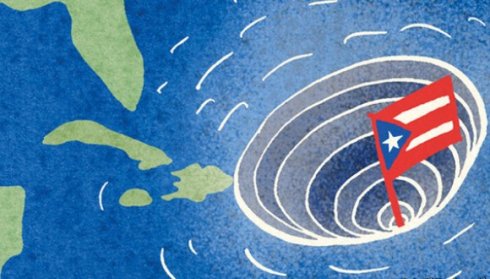This is a translation of an article originally published in Spanish in La Izquierda Diario.
For working class people, the situation is bleak. Before the year’s end, pension payments may be halted altogether. The PR government declared that it would either pay back part of its debt to “vulture funds” that total about $73 billion dollars or fund social services such as health and education.
The legislative reform proposed by Obama has the potential to alter the Puerto Rico’s status as an Associated Free State,” nudging it closer to the juridical status of another state within U.S. territory, a trend that raises as much alarm in Puerto Rico, as it does in the larger continental U.S.
Today, the Puerto Rican government is unable to solicit direct intervention from the IMF; nor does it have the option of devaluing the currency, which is already the U.S. dollar.
Governor Alejandro García Padilla and his Plan
According to a report by the Work Group (Grupo de Trabajo), since 2008, workers’ payroll in the state has dropped by 27 percent. Today, 8.7 percent of the population works in state agencies, compared to 8.9 percent
As part of a fiscal adjustment package in 2010, working hours were reduced, “voluntary quit” programs were implemented, and collective bargaining negotiations were suspended. The following year, numerous layoffs took place. In 2013, Sewage and Aqueduct Authority subsidies were eliminated, leading to higher costs for water services.
In 2014, Christmas bonuses above $600 were prohibited, as were sick leave payments, unused vacation, and government bonuses. This year, funding for public education was cut. These are just a few measuretaken by the PR government fulfill their commitment to vulture funds.
Beginning in 2016 the value-added tax (IVA) will be 16 percent, which will affect the working class directly. Similarly, sales and port taxes will increase from 7 to 11.5 percent.
According to the same report, only 40 percent of the adult population is working or currently looking for a job. while the remaining majority subsists on government programs and/or the informal economy.
Facing this panorama, the Puerto Rican government has proposed a plan of “economic growth and structural reforms” that basically calls for the precaritization of working conditions, as demanded ex-IMF officials like Anne Krueger.
The plan includes measures such as placing limits on severance pay for dismissals up to 6 months and the exclusion of benefits that are not part of the salary. The proposal will enable companies to gain exemption from christmas bonuses; extend employment trial period to 1 year; and implement a 10-year freeze on the minimum wage for young workers up to 25 years old.
At the same time, the plan seeks to open up the production and provision of electrical energy to private capital and reduce corporate taxes.
On October 22, Governor García Padilla appeared before the U.S. Senate Committee on Energy and Natural Resources to discuss the economic crisis and debt in Puerto Rico. He requested that Puerto Rico default in order to avoid a bigger debacle: an international lawsuit by vulture funds against the island government.
From October 27 to 28, the governor initiated negotiations to restructure the debt with six creditors. However, there still exists a possibility that Puerto Rico will declare bankruptcy in November. In addition, the “Revitalize the AEE (Electrical Energy Authority)” project was unveiled last week. It included the precaritization of government jobs, as well as plans to open up the electrical industry to the private sector — a step closer to privatization. Workers are opposing these reforms.
Workers’ Solution
The traditional political parties, vulture funds, Obama administration, and private sector seek to force the crisis down workers throats. They want the people to pay for the crisis through the degradation of working and living conditions.
This brutal threat makes it necessary for Puerto Rican workers to break away from the United States and gain independence. Eduardo Bhatia, president of the Puerto Rican Senate from the Popular Democratic Party is putting forward a law to allow for the privatization of the education system.
Workers of the Electrical Energy Authorities (AEE) have already shown their willingness to fight against the State.. The combined forces of public and private sector workers and AEE workers in particular can put a break on this new neoliberal attack.
With the strike and the perspective of the general political strike, the working class can impose a moratorium on external debt payment to the speculative vulture funds and impede the application of Governor Padilla and President Obama’s structural reforms.
The Puerto Rican working class should extend their reach and solidarity to the exploited and oppressed sectors of the United States: immigrants, African Americans, Puerto Rican workers living on the continent. The working class has no borders!
Translated by: Paolo Guerrero











